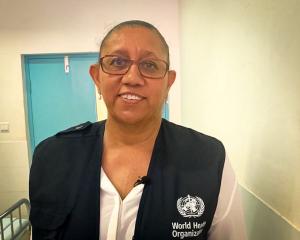Meet team WHO: Dr Carolina Leite, Disease Prevention & Control Advisor, Cape Verde
A Medical Doctor with an MSc in Public Health and over 20 years of experience, Dr Carolina Leite led Cabo Verde’s programme to fight malaria and waterborne diseases and served as Director of Patient Management, Medical Records and Statistics at the Agostinho Neto Central Hospital in Praia before joining the World Health Organization (WHO) in 2009.
Since then, she’s worked on HIV-Tuberculosis and Malaria programmes, served as Co-ordinator of the joint United Nations team for HIV-AIDS and as Disease Prevention and Control and Programme Support Advisor for WHO in Cape Verde since 2011.
Tell us about your work with WHO in Cape Verde
I am responsible for providing technical support to the planning, implementation and the evaluation of Cabo Verde’s integrated disease surveillance and response system, as well as the disease prevention and control programme. This involves helping the country put in place a comprehensive strategy and working to build up strong systems to track trends around diseases, detect outbreaks early and then quickly respond to them based on good evidence.
I also lead WHO's work on routine immunization and the introduction of new vaccines, including the inactivated polio vaccine in 2017, the yellow fever vaccine in 2018 and of course COVID-19 vaccines this year.
What are the big successes and challenges in Cabo Verde's COVID-19 vaccine rollout?
The biggest successes are around the government’s political will and drive to meet the standards set by COVAX, which, with partners, helped ensure the country was well prepared to roll out the vaccines when they arrived.
Strong community outreach helped ensure that many people were keen to get vaccinated. Cabo Verde built on its long experience and skilled workforce that was built up through routine immunization campaigns. Working with partners to share WHO-approved tools and guidelines, as well as jointly monitoring activities, has been key to continually improving.
Like much of Africa, supply security has been the biggest issue and the rapid spread of new variants made this even more urgent. Like other countries, a lack of funds and resources for operational aspects, whilst maintaining other essential health services, stretched the country’s capacities quite thin.
Cabo Verde is administering three different types of two-dose COVID-19 vaccines. Among people aged 18 and over we have hit 69% coverage for the first dose and 20% for two doses.
What drives your commitment to your work with WHO?
I have always enjoyed working with people and communities, hence the focus on public health. WHO is the lead agency in public health.
Working on the response to this unprecedented pandemic has been rewarding and I’ve particularly enjoyed helping to strengthen Cabo Verde’s laboratory capacities and supporting the vaccine rollout.
What are you most proud of?
I’m proud to play a part in improving the health of the population of my country, including eradicating vaccine preventable diseases and in keeping routine vaccination coverage for polio, measles and neonatal tetanus above 95% for over 10 years running, as well as supporting the introduction of new vaccines, such as for HPV and COVID-19.
It was great to play a small part helping Cabo Verde be declared polio free in 2016 and in working towards eliminating malaria. We have had three years with zero cases of indigenous malaria so far and we are very much looking forward to being certified as malaria free.



